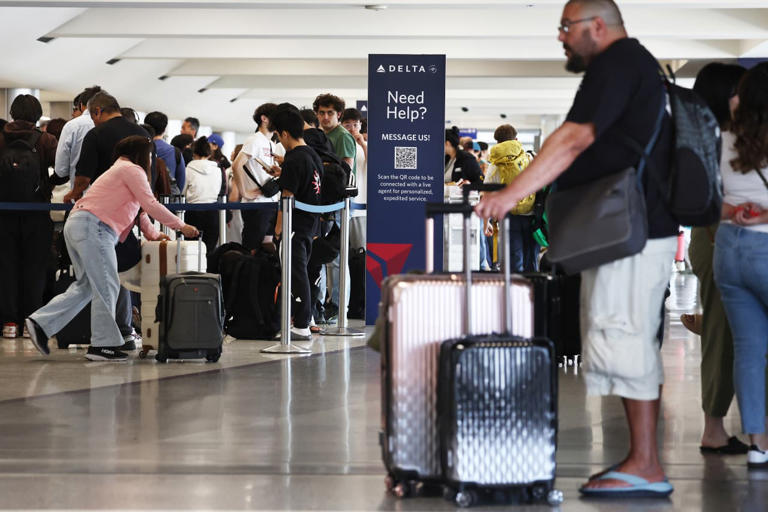In recent months, even companies that once seemed impervious to market fluctuations have faced unexpected challenges, revealing the vulnerability that can affect even the most dominant players in their respective industries. Two notable examples are CrowdStrike Holdings and Delta Air Lines, both of which have encountered significant issues that have undermined their previously unassailable positions.
CrowdStrike Holdings, a prominent cybersecurity firm known for its advanced endpoint protection software, faced a critical failure on July 19. A software update went awry, leading to widespread outages across the internet. This issue not only disrupted numerous client operations but also exposed CrowdStrike to severe criticism. The problem took an entire week to resolve, with the company managing to fix 97% of the issue by the following Friday. The repercussions of this disruption were far-reaching, affecting other companies reliant on CrowdStrike’s technology. Delta Air Lines was notably impacted; the airline was forced to cancel approximately 6,700 flights due to the software issues. Delta’s inability to swiftly address the problem compared to its competitors highlighted its vulnerabilities. As a result, CrowdStrike’s stock suffered a dramatic 34% decline within the month, while Delta’s shares fell by 8.4%.
Despite their disparate sectors, CrowdStrike and Delta share a common thread in their recent troubles. CrowdStrike, trading at a lofty valuation of 78 times its 12-month forward earnings as of July 18, was lauded for its high growth potential and stellar execution in cybersecurity. The company’s reputation for providing robust security solutions had driven its stock up by 54% this year, outpacing the iShares Expanded Tech-Software Sector ETF and the Nasdaq Composite. On the other hand, Delta Air Lines had been recognized for its superior operational management and customer loyalty programs, boasting investment-grade credit ratings from Fitch Ratings and Moody’s Investors Service. Historically, Delta had outperformed its industry peers, achieving a stock performance that exceeded the U.S. Global Jets ETF by a notable margin over the past five years.
However, the recent events have cast doubt on both companies’ once-secure positions. For CrowdStrike, the software update failure has created an opportunity for competitors such as Palo Alto Networks and SentinelOne to potentially attract clients who may now question CrowdStrike’s reliability. The incident has not only inflicted financial damage but also damaged the company’s reputation. UBS analyst Roger Boyd has placed his Buy rating on CrowdStrike under review, acknowledging the challenge of assessing the competitive impact so soon after the incident. The reputational damage could have long-term consequences for the company’s market positioning and customer acquisition strategies.
Delta Air Lines faces a similarly challenging situation. The airline industry has always been fraught with financial volatility, and Delta’s recent difficulties have reinforced the negative perceptions associated with investing in airlines. The flight cancellations and operational disruptions have led to an estimated $350 million hit to Delta’s third-quarter operating profit, according to Melius analyst Conor Cunningham. The ongoing investigation by the Department of Transportation into Delta’s handling of the situation adds to the airline’s woes. Until Delta provides a clear plan to address the issues and restore investor confidence, its stock is likely to remain under pressure. Despite being one of the better-positioned airlines in a difficult industry, Delta now has to contend with both financial losses and reputational damage.
The experiences of CrowdStrike and Delta underscore a broader lesson in the market: even companies with strong track records and market leadership are not immune to setbacks. Historical examples, such as General Electric and Intel, demonstrate that even dominant firms can struggle over time. General Electric, once a symbol of corporate stability, has faced significant challenges since the early 2000s. Similarly, Intel, once a leader in semiconductor technology, has grappled with the rise of competitors like Nvidia. IBM, once a gold standard in computing, has seen its stock underperform compared to the S&P 500 over the past 15 years.
The S&P 500 itself, heavily influenced by major technology stocks like Apple, Microsoft, and Nvidia, remains a dominant force in the global market. Despite a recent 2.8% decline, the index continues to reflect the strength of its constituent companies. Yet, the recent troubles faced by CrowdStrike and Delta serve as a reminder that no company or index is entirely immune to disruption. The notion that any entity is truly unassailable is a misconception; the market is always subject to unforeseen challenges and changes.
